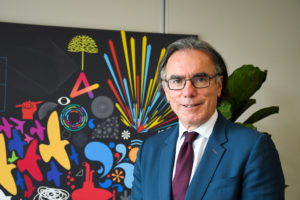By Paul McDonald, CEO of Anglicare Victoria
17th June 2020
One thing hasn’t changed during the COVID-19 pandemic – vulnerable people need our help more than ever.

Whether our clients are young people in state care, those affected by family violence or alcohol and drug addiction, we have embraced new ways of working so that help is always there when it’s needed. And those of the Anglican faith continue to show their trademark spirit of generosity, ensuring that people who have lost their income and independence as a result of this situation have somewhere to turn.
For an unprecedented challenge such as the coronavirus, Anglicare Victoria had to respond with unprecedented innovation in the way we deliver services. Given the client base we work with, the stakes could not have been higher. Fortunately our teams are in overdrive adapting programs to meet the needs of Victoria’s most vulnerable people.
The highly contagious nature of the virus means the health and safety of our clients and staff has to be our priority at all times. So the first step was to introduce a range of measures to minimise the risk of exposure and ensure sterilising and hand-washing became part of our everyday routine.
In some of our residential care facilities, staff played a game of “guess the song”, where they played a track for 20 seconds while young people washed their hands for the length of time recommended by our health authorities. And overall young people in our care have adapted well to the changes, doing many things virtually through their phones or computers that they used to do in person.
Possibly the greatest surge in demand has been for our parenting services, with one region reporting three times the number of clients for our ParentZone program which supports mums and dads doing it tough. The webinars we have offered on parenting and schooling during COVID-19 continue to hit capacity, showing how much families need practical advice right now, along with some extra care and support.
At our emergency relief centres, introducing social distancing and sterilising surfaces has been straightforward. Isolated families receive care packages at these locations, and in some cases, these are home delivered. In the case of financial counselling, phone consultations have been a blessing for some clients. Some of these people are seeking our help for the first time – and the extra distance helps to take the stigma out of the process.
We have also worked with the Victorian Government to make one of our properties available as an isolation and recovery facility for any homeless young people with health issues. The facility offers 24-hour care and support to these vulnerable Victorians who need medical attention. Procedures are now in place to look after both staff and patients, and clients can be transported to and from the facility in a way that ensures they will not come into contact with nearby residents and businesses.
Many began this journey fending for themselves, but along the way a lot of people have rediscovered their sense of community. There are a lot of small things we can do as a collective that can be a powerful force for good.
We know that the more fortunate in our community are actively seeking ways to help those in need. And Anglicare Victoria is running an appeal to raise funds so that we can assist as many children, families and individuals as possible during these times. From remote education packs to clean clothes for those in need, emergency food and essentials, and single parents who are struggling, there are so many desperate people in need right now.
The challenges of this crisis will last far longer than the next few months, but we will be there for the long haul to help those in need, whenever they need it.
Thank you to The Melbourne Anglican, which first published this piece.


